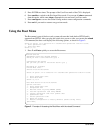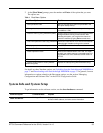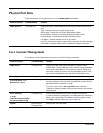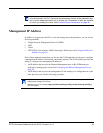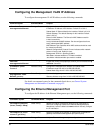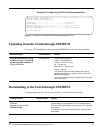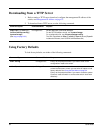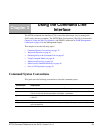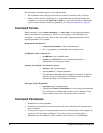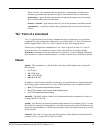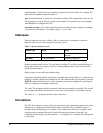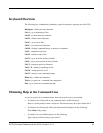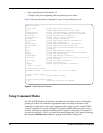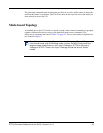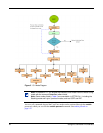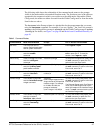
40 Using the Command Line Interface
The following conventions apply to the command name:
• The command name is displayed in bold font. It must be entered exactly as shown.
• When you have entered enough letters of a command name to uniquely identify the
command, you can press the space bar or Tab key to cause the system to complete the
word. For more keyboard shortcuts (speedkeys), see Keyboard Shortcuts on page 43.
Command Format
Some commands, such as show inventory or clear vlan, do not require parameters.
Other commands have parameters for which you must supply a value. Parameters are
positional — you must enter the values in the correct order. Optional parameters follow
required parameters. For example:
snmp-server location loc
• snmp-server location is the command name.
•
loc is a parameter—a placeholder for a required value.
ip address ipaddr subnetmask
• ip address is the command name.
•
ipaddr and subnetmask are two required parameters —
placeholders for two required values.
mtrace sourceipaddr [destination] [group]
•
mtrace is the command name.
•
sourceipaddr is a required parameter
• The parameters
destination and group are in brackets to indicate
that they are optional parameters, and being in separate brackets
indicates that they are not mutually exclusive.
mac-type {local | burnedin}
•
mac-type is the command name.
• The keywords
local and burnedin are in curly braces and separated
by a veritcal bar to indicate that you must one. If, instead of curly
braces, brackets were used, a keyword would be optional.
Command Parameters
• Parameters are order-dependent.
• Parameters are displayed in this document in italic font, which must be replaced with a
name or number.
• To use spaces as part of a name parameter, enclose it in double quotes. For example, the
expression "System Name with Spaces" forces the system to accept the spaces.
• Parameters may be mandatory values, optional values, choices, or a combination.



